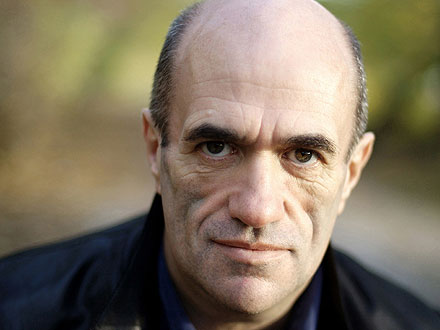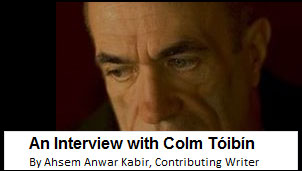
For over thirty years in journalism, short and long fiction, criticism, speeches, essays and lectures, Colm Toíbín has
explored the power and significance of family—for good or ill—and extended readers’ understanding of “family” to include
not just those familiar domestic groupings created by birth or by sexual and social affinities, but also larger, shifting
and overlapping family groups, sustained or divided by tribal, national or religious, political, and civic identity. These
families may be whole or broken, healthy or healing, fortunate or cursed, but they are always powerfully present, exerting
their influence on family members, defining individuals by inclusion and exclusion. Begin by examining the construct family
and the themes yield themselves: exile, estrangement, and reconciliation; the push and pull of home; and the close link
between love and rage.
The personal is a hallmark of Toíbín’s writing and his world view: how else can one grasp history, politics, or culture?
One cannot be an Irish writer raised in the shadow of Vinegar Hill without being conscious of the burden of tribal and
national culture and history, nor a gay man with a profoundly Catholic upbringing and be unaware of the many ways in which
families may break and reassemble themselves or of the obligations conferred by shared lives and affinities.
In his nonfiction, “family” may take the form of Irish men and women negotiating life along the borderlands during the
uncertain years between the Anglo-Irish Agreement of 1985 and the 1998 Good Friday Agreement, or present day European
Catholics whose shared faith (or lack of faith) is shaped as much by locale and local history as by doctrine. His body
of literary criticism focuses more narrowly on family dynamics: the vexed relationships of authors and their siblings
and parents and lovers, or the need for kinships of spirit when consanguinity proves too vexed.
Fiction, of course, is the art of the personal, and the arc of his novels and short stories frequently traces this breaking
and reassembling among ordinary families living on the decaying southeast coast of Ireland or stretched across the Atlantic
in diaspora. Literature also offers us universal touchstones for our personal experiences; thus in other works Toíbín shows
us the same dynamics working out in the great, haunted, and tragic families of history and mythology. The wife and children
of Agamemnon and the mother of God suffer exile and loss, are torn between love and anger, and long to be made whole as we do.
Colm Toíbín asks his readers to contemplate “the deep sadness of exile” whether from mother or brother, from home or nation,
from one’s truest self—and to understand how accidents of geography and family shape identity, or how quirks of circumstance
can harden or soften hearts. He helps us understand the longings and complexity of intimates and strangers, even those whose
actions we may deplore. His writings remind us of our shared humanity and offer the possibility of reconciliation or simply
of understanding, which are the first steps to making peace.
Carol S. Loranger
Chair, Department of English Language and Literatures
Frederick A White Distinguished Professor
of Professional Service
Wright State University

|

Books by Colm Tóibín
(Click covers to visit publishers' websites.)
|
|
 |

2017 Richard C. Holbrooke
Distinguished Achievement Award


(Click photo to see acceptance speech at awards dinner.)
Colm Tóibín
"Our task as writers is to work on our sentences, pay close attention to the rhythm, texture
and tone of prose. Mostly, our books will be read silently, as they are written silently. Our
aim is to reach the reader’s imagination, have an effect on the nervous systems of other people.
In ways that are both powerful and mysterious a book or a story can deepen the complexity of
who we are in the world, how we feel, offering no easy resolutions, no simple images. Through
fiction, we learn to see others. The page is not a mirror. It is blank when I start to write,
but it contains a version of the world when I finish. It is there for others to be inspired
by. Slowly then, a sentence or set of sentences that have their own integrity, their own sense
of balance, their own striving towards worth, can become a sonorous metaphor for much else,
including for how we might live in the world, how we might see others, what we might do. Good
writing thus has elements and undercurrents that are moral as much as aesthetic. Good sentences
offer us a way to imagine life in all its strangeness and ambiguity and possibility, alert us
to the power of the imagination to transform and transcend our nature, offer us a blueprint
not only for who we are but for who we might be, who we might become."
- Colm Tóibín
Colm Tóibín was born in Ireland in 1955. He studied at University College Dublin. On graduation, he lived in
Spain, studying Catalan and Spanish, and witnessing the transformation of the country to democracy. His time
in Spain inspired his first novel ‘The South’ (1990) and his ‘Homage to Barcelona’ (1990).
On returning to Dublin, he worked as a journalist, becoming editor of ‘Magill’, Ireland’s main current affairs
magazine. Later, he traveled in South America and Africa, covering the trial of the generals in Buenos Aires
in 1985. The atmosphere in Buenos Aires in the aftermath of the dictatorship is captured in his novel ‘The Story
of the Night’ (1996). In 1986 he walked along the border between Northern Ireland and the Republic of Ireland.
His account of that journey was called ‘Bad Blood’ (1987).
Three of his novels have been short-listed for the Man Booker Prize – ‘The Blackwater Lightship’ (1999), ‘The
Master’ (2004), ‘The Testament of Mary’ (2012). ‘The Master’ also won the LA Times Novel of the Year, and the
stage version of ‘The Testament of Mary’ was nominated for a Tony Award for Best Play. His other novels are
‘Brooklyn’ (2009), ‘Nora Webster’ (2014) and ‘House of Names’ (2017). His essay collections are: ‘The Sign of
the Cross: Travels in Catholic Europe’ (1994), ‘Love in a Dark Time: Gay Lives from Wilde to Almodovar’ (2002)
and ‘New Ways to Kill Your Mother: Writers and their Families’ (2012).
He has taught at Stanford, Princeton and the University of Texas at Austin. He is currently Irene and Sidney B.
Silverman Professor of the Humanities at Columbia University, a contributing editor at the London Review of
Books and Chancellor of the University of Liverpool.
==> Read the full press release
Interview:

(Click image to read interview.)

|
|